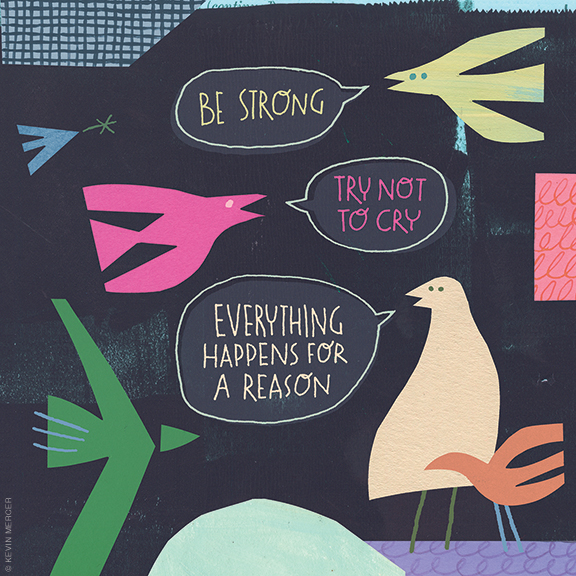EXCERPT FROM MY BOOK IN THE PENNSYLVANIA GAZETTE

Please don’t tell me he’s in a better place!
BY LAURIE BURROWS GRAD
Of all the things people say to me about my husband, who died suddenly and shockingly during our annual vacation in the 47th year of our marriage, it truly irks me when people sermonize, “He’s in a better place.”
I want to scream, “No, he’s not! He should be sleeping beside me. That is a better place.” I can think of a lot better places—like Cabo in the winter, Maine in the summer, or Italy any time. The best place would be alive and healthy and, of course, with me. If Peter were in a better place, he would be playing golf in Pebble Beach. That would truly be a better place. Then of course I would be a golf widow, instead of just a widow.
Which brings me to the subject of preaching clichés. I was a big-time offender before I learned the parameters of grief. I might have said the same banalities to console someone who had suffered a loss. But I have had a swift education, which I will now pass on to you. Allow me to help you communicate with someone who has lost her or his life partner. Please do not tell us that “the living must go on!” Who can judge when any of us are ready to move on in our grief processes? Maybe others want me to move on so I will be my peppy self again and they can feel more at ease, but they will have to wait for as long as it takes.
“Everything happens for a reason,” “It’s all part of God’s plan,” and “God never gives you more than you can handle” are hard for me to fathom these days. Even if you think any of these bromides are true, I’m begging you not to share them. Here’s another doozy of a cliché: “All things must pass.” You think? Peter passed away, and I am bereft. Who makes up this claptrap? Then there is “He led a full life.” Why are others the judges of what kind of life Peter had? How about “Be grateful you had him so long”? Right now, I miss him so much that nothing hurts more than this statement. “He would want you to get on with your life” is another. Sure, he would, but I’m pretty sure I know my husband better than anyone, and he would want me to grieve and heal first. “Time heals all wounds” is downright wrong. Time doesn’t heal. Grieving heals. Crying heals—oh, and sometimes wine with crying too! One of the worst platitudes is “You’ll find someone else.” This belittles what we had; it belittles Peter, and it belittles me that I would be looking to replace my sweet love.
When Peter died, I suffered the greatest ordeal imaginable. I had a deep and intense loss, but I definitely didn’t “lose” him. I, myself, am guilty of using the term “lose” on multiple occasions. I repeatedly said “I recently lost my husband” to friends, accountants, tax people, and even telemarketers. One day, when I was saying I had lost Peter, I realized it was not true. I didn’t lose Peter. He died. I experienced a loss, but I didn’t lose or misplace him. Saying that I lost him implies I am careless and makes me feel guilty that I wasn’t vigilant enough to hold on to him. When you lose your keys, you expect to find them. When you lose your iPhone, you have the Find My iPhone app to locate your device. We expect to find the items we lose. Peter is not lost. He died, and there is no Find Peter app to download and locate my sweet love.
When there is a death, many people say that the person has “passed.” This is another banality that is hard for me to stomach. I assume this came from the belief of passing from one life into a spiritual afterlife. It is clear to me that Peter passed the gravy; he passed a football when he was young; he passed a gallstone; he passed notes in class; and for sure he passed gas; but he didn’t pass away. He died. He “slipped away” is another euphemism that I could easily avoid. I think of slipping away as escaping from being trapped. Peter didn’t slip away willingly. His heart gave out, and he died.
I recognize that people want to comfort me. They may say things that are thoughtless, but they are trying to help. I have learned a tolerance of others and am trying, through my blogging, to educate friends, family, and the public on the best way to support me on my journey through grief.
I have good news and bad news. Below I have compiled the Top Ten Worst Things to Say to Someone in Grief (the bad news), followed by the good news, The Top Ten Best Things to Say.
The Top Ten Worst Things to Say to Someone in Grief:
1. He’s in a better place. (A better place would be beside me now.)
2. Everything happens for a reason. (There is no rhyme or reason for this kind of loss.)
3. Time heals all wounds. (Time doesn’t heal all wounds, although healing takes time.)
4. Try not to cry. He wouldn’t want you to cry. (He’d be bawling his eyes out.)
5. It is time to put this behind you. (There is no timetable for grief.)
6. At least he lived a long life. If you think this is bad … (No comparisons, please.)
7. I know how you feel. (Do we ever really know how someone feels?)
8. Let me tell you about my own loss, which is similar to yours. (Please just listen and acknowledge my loss.)
9. Surely, you’ll find someone. (This diminishes the person’s loss and the loved one.)
10. You’ll get through it. Be strong. (This tells people to hold on to their grief and not let it out.)
Now that we know what not to say to people who are grieving, here is a list of thoughtful remarks for those who want to know the kindest thing to say in times of grief.
The Top Ten Suggestions to Say to Someone in Grief:
1. I am sorry for your loss. This is the tried and true easiest thing to say.
2. The best thing one can say is “I love you.” Actually, a hug is the very best thing, since someone whose spouse has died does not get hugs on a regular basis.
3. I wish I had the right words to comfort you. Just know that I care.
4. I don’t know how you feel, but I am available to help in any way I can.
5. I am always a phone call or email away.
6. It’s OK to cry, and it’s OK to hurt.
7. My favorite memory of your loved one is …
8. Please let me know how I can help you.
9. How are you doing this minute?
10. Say nothing. (Just be present with the person.)
Laurie Burrows Grad CW’66 is the author of The Joke’s Over, You Can Come Back Now: How This Widow Plowed Through Grief and Survived, from which this essay is excerpted.










